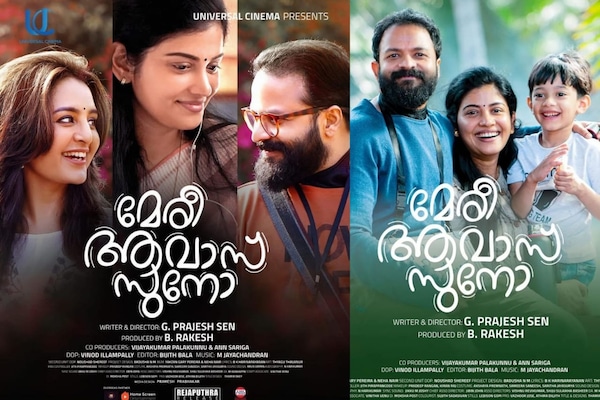Meri Awas Suno review: Jayasurya gives a phenomenal performance in this emotionally charged Prajesh Sen directorial
Manju Warrier too shines as the endearing speech therapist Reshmi, although her character comes across as two-dimensional and even cliched on more than one occasion.

Last Updated: 06.26 AM, May 14, 2022
Story:
RJ Shankar (Jayasurya) is dealt a blow in life when he is diagnosed with cancer. The treatment leads him to lose one of the most important things in his life - his voice. Devastated, Shankar is plunged into a period of immense grief, becoming reduced to a shell of his former self. When renowned social worker Dr. Reshmi Padath (Manju Warrier) enters his life, she helps Shankar adjust to his new normal and instills in him a new appreciation for life.
Review:
To emulate the grief that comes with an acquired disability, especially one that hinders one from doing the things one loves in life, is a challenging task for an artist, especially if one does not have a personal experience related to the same. In Meri Awas Suno, Jayasurya gives a formidable testimony to his acting prowess yet again, with his compelling portrayal of a man coming to terms with the loss of one of the most important things in his life - his voice.
The film certainly takes its time to get to the actual crux of the story, the first act taking the time to establish the importance of his voice in RJ Shankar’s life. It would be a statement of the obvious to say that their voice is the most important part of an RJ’s identity. But the film really tries to drive home the same to showcase how his voice isn’t just an important part of Shankar’s trade, but also a crucial component of his overall identity. In trying to do so, the script does tend to overreach at times. Shankar’s work as an RJ is depicted to be nothing short of life changing for his viewers, and the writer went so far as to showcase it in a literal sense with a sequence involving a young listener who is on the verge of making an unwise decision. And if that sequence did not make it obvious enough to viewers, Shankar himself makes sure to say, in these exact words, that his voice is indeed his identity. In trying to make the loss more impactful with these sequences, that overrule the entirety of the first act, the film ends up starting off on a painfully slow note that is difficult to hold one’s attention.
The second act, where Shankar has to come face to face with his loss, is where Jayasurya shines. The devastation and hopelessness at losing a treasured part of himself reduce Shankar to a shell of his former self, and Jayasurya’s moving performance manages to capture it all in the full weight of it. Unable to make use of his voice, the actor is provided with ample opportunities to subtly make the predicament of his character known. Acceptance is regarded as the very last stage in the grieving process, and Jayasurya makes sure to give anger and desperation their deserved space,leading to an emotionally-charged performance that is tear jerking on more than one occasion.
Although Manju Warrier’s character of Dr Reshmi is introduced in the film way before Jayasurya’s, it is not until the second act where she crosses paths with Shankar that her role truly begins. Although she is intended to be a strong and endearing female protagonist, director Prajesh Sen’s writing fails to do justice to that vision. Right from her introductory scene, it is obvious she is intended to be an endearing rule breaker, unafraid to go against the flow and live life on her own terms, while trying to help those around her do the same. But the character ends up being terribly two-dimensional at times and also insensitive. As Reshmi tries to help Shankar regain some semblance of a voice, she resorts to methods that become increasingly extreme. A single phrase explanation of the same as ‘scientific’ does little to allay the dubiety of it all. It is not until the third act, when the character starts to mellow down her approach and gives away the shroud of insensitivity, that we see Manju shine.
Sshivada stars as Shankar’s wife Meryl. The writing more or less does justice to Meryl, doing a good job at capturing the emotions and mindset of the supportive character. She is a character with her fair share of flaws, despite trying to provide her husband with the unwavering support he needs. And her insecurities ultimately lead to the way Shankar and Reshmi’s story culminates.
The way the story unfolds is not without its pitfalls either. More than once, predictability and cliches plague the script and premise, and it sways dangerously close to becoming preachy as well. But to his credit, Prajesh Sen has made an appreciable attempt at an inspiring story of grief and loss.
Verdict:
Meri Awas Suno has its fair share of shortcomings, from a script that falters on more than one occasion to a story that dangerously comes close to being melodramatic and preachy. But Jayasurya rises above them all, with a phenomenal performance that cannot be missed.
Subscribe to our newsletter for top content, delivered fast.

